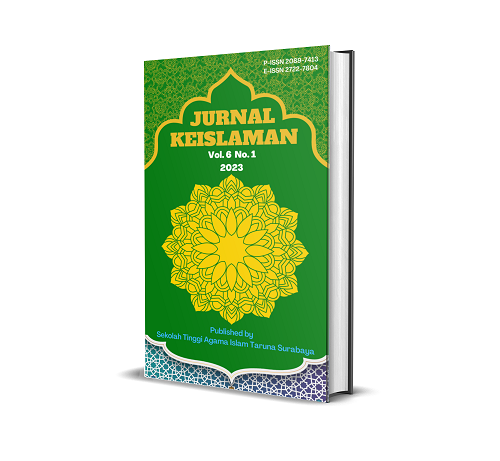Problematika Pendidikan Agama Islam di Universitas Khairun Ternate
Abstract
The aim of the research is to look at the problems of Islamic religious education in Public Higher Education and solutions to these problems in this paper focusing more on State Universities in North Maluku Province, namely Khairun University, PAI hopes that colleges and universities can understand and realize religious education courses as a compulsory subject that is the spirit of fostering student personality and the spiritual foundation for the development of their respective fields of knowledge. In this study the method used is the method that researchers use in this study is phenomenology. The phenomenological approach is an approach based on the idea and assumption that human experience is obtained through the interpretation of objects, people, situations and events, but their interpretation. The results of the research are that the development of PAI is an implication of the learning process on campus, requiring the development of faith values in students' attitudes and behavior that can be applied in life. The development of PAI at PTU needs to be updated starting from the cognitive learning process to instilling Islamic values in students so that they can have a positive impact on student self-development.References
Abdi, Muhammad Iwan. “Penulis Adalah Dosen Tetap Prodi Pendidikan Agama Islam Jurusan Tarbiyah STAIN Samarinda 1 Nurhadi, Kurikulum 2004 Pertanyaan Dan Jawaban. (Jakarta: Grasindo, 2004), Hal. 103. ,†2004.
Ansyari, Muhammad Zidane, Urwatul Wusqo Nur Salsabila, and Muhammad Khairul Rijal. “Problematika Pendekatan Saintifik Pada Pembelajaran PAI.†Tarbiyah Wa Ta’lim: Jurnal Penelitian Pendidikan Dan Pembelajaran 5, no. 3 (2020): 47–55. https://doi.org/10.21093/twt.v5i3.2229.
Fathoni Ahmad, Tantangan Pendidikan di Era Digital, Bagaimana Menyikapinya?adrasah.kemenag.go.id/didaktika/96/tantangan-pendidikan-di-era-digital-bagaimana- menyikapinya.html, diakses pada 13 Februari 2019
Miles, Matthew B., and A. Michael Huberman, Analisis Data Kualitatif, (Jakarta: UI Press,2010), hlm. 85
Mubin, M.N. “Problematika Dan Solusi Pendidikan Agama Islam (Pai) Di Perguruan Tinggi Umum (Ptu).†Tarbawi : Jurnal Pendidikan Islam 18, no. 2 (2021): 9–24.
Nasih, A Munjin, Achmad Sultoni, Titis Thoriquttyas, and Delta Pijar Khatulistiwa. RAGAM PENGUATAN PENDIDIKAN AGAMA ISLAM ( PAI ), 2020.
Nasih, A Munjin, Achmad Sultoni, Titis Thoriquttyas, and Delta Pijar Khatulistiwa. RAGAM PENGUATAN PENDIDIKAN AGAMA ISLAM ( PAI ), 2020.
Nuryadin, Strategi Pendidikan Islam di Era Digital, Fitrah Jurnal Kajian Ilmu-Ilmu Keislaman, Vol. 03, No. 1 Juni 2017, hlm. 216-22
Oemar Hamalik. 2003. “Manajemen Belajar di Perguruan Tinggi: Pendekatan Sistem Kredit Semester (SKS)â€,Bandung: Sinar Baru Algesindo. Rifqi
Rahim, Ratna. “Problematika Pendidikan Agama Islam Di Perguruan Tinggi Umum (PTU).†Jurnal Andi Djemma | Jurnal Pendidikan 3, no. 1 (2020): 49–58.
S. Lestari dan Ngatini, Pendidikan Islam Kontekstual, (Yogyakarta: Pustaka Pelajar, 2010), cet ke-1, hlm. 84. 5
Sudarwan Danim, Menjadi Peneliti Kualitatif, (Bandung: Pustaka Setia, 2002), hlm. 64-65
Terjemah Kemenag 2019
Copyright (c) 2023 Bujuna Alwi Alhadad, Mizna Laila Albaar, Syarifuddin Ondeng

This work is licensed under a Creative Commons Attribution-ShareAlike 4.0 International License.
Authors who publish with this journal agree to the following terms:
- Authors retain copyright and grant the journal right of first publication with the work simultaneously licensed under a Creative Commons Attribution-ShareAlike that allows others to share the work with an acknowledgement of the work's authorship and initial publication in this journal.
- Authors are able to enter into separate, additional contractual arrangements for the non-exclusive distribution of the journal's published version of the work (e.g., post it to an institutional repository or publish it in a book), with an acknowledgement of its initial publication in this journal.
- Authors are permitted and encouraged to post their work online (e.g., in institutional repositories or on their website) prior to and during the submission process, as it can lead to productive exchanges, as well as earlier and greater citation of published work (See The Effect of Open Access).






















